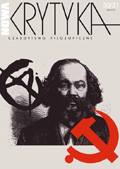Marksa uwięźnięcie w kulturze przyczyną utopijności utopii komunistycznej
Marx getting stuck in the culture as the reason for utopianism of communist Utopia
Author(s): Adam KarpińskiSubject(s): Philosophy, Marxism
Published by: Wydawnictwo Naukowe Uniwersytetu Szczecińskiego
Keywords: Utopia; real and Utopian Utopias; K. Marx; F. Engels; social existence; communism; the Utopian Utopia; genuineness of culture; Gramscism; Schafism; divinity & humanity; the God of philosophers
Summary/Abstract: In the article, the following types of Utopia are described: real and Utopian Utopias. The former are a projection into the future of such thoughts which have a chance to materialise, become certain reality. The latter are fantasy which has no chance to materialise. In Ihe context of such distinction, the author analyses Utopia of Karl Marx and Friedrich Engels. Their Utopia, building communism, is realistic. Many of its elements have already been realised. Further development of social existence may however cause that the Utopia of communism will become the Utopian Utopia, i. e. will transform into a fictional fantasy. Why this may happen? The article is an attempt to answer the above question. In my view, the reason for such situation is the fact that both Marx and Engels got stuck in the culture. In their times, as well as in the contemporary culture of Western Europe, particularly in the Anglo-Saxon culture, there exists a two-element ontology of the social existence. Meanwhile, the entirety of the existence consists of three elements: the general (material or ideal), the particular and the individual. The second element has been eliminated. Therefore, the culture is functioning based on a formula: either... or... Existence is genuine if at least one element of it is genuine. We ask therefore: which culture is genuine: Polish or German? When treating three elements of social existence as given conditions, we cannot apply an alternative but a conjunction. Both Polish and German cultures are genuine. Lack of the said second element of the three-element entirety may transform Utopia of communism into a Utopian Utopia. Communism would host capital owners living according to Marx' concept (1% of the world's population). The remaining people will live and will be needed for as long as labour is cheaper than robots. What can be done in such situation? It would be best to complement Marxism with contents hidden behind the second element of the social existence, that is 'the particular'. A. Gramsci has already started to do that. In Polish People's Republic it was started by Adam Schaff. It is visible in his book entitled Marxism and a human individual. Therefore, in the second part of the paper the author presents some attempts of complementing Marxism. It consists in the idea of divinity and humanity. No one should be dismayed by the term God. Here, he is the God of philosophers and not that of theologists.
Journal: Nowa Krytyka: czasopismo filozoficzne.
- Issue Year: 2013
- Issue No: 30-31
- Page Range: 289-318
- Page Count: 30
- Language: Polish

